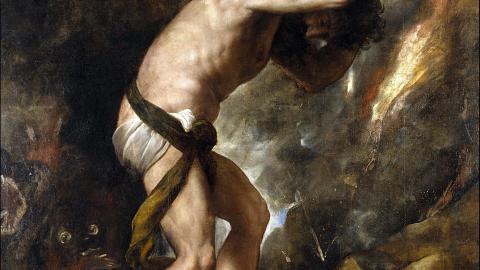Albert Camus on why accepting absurdity is the start of a fruitful life

Public domain
- Camus thought that life was absurd, but that knowing that was a beginning, not an end.
- By realizing it is all absurd, you have the opportunity to rebel against the meaninglessness.
- Søren Kierkegaard, another philosopher, went with a different answer.
If you haven’t noticed, life is absurd. We humans strive to find meaning in the world, and the world responds with cold indifference. This contrast, often made evident when senseless and meaningless tragedy occurs, is inherent to most people’s relationship to the world.
While the idea that life has no inherent meaning can be jarring even to the point of despair, many philosophers who studied the problem think it doesn’t have to be that way. Albert Camus event went further, arguing that “accepting the absurdity of everything around us is one step, a necessary experience: it should not become a dead end. It arouses a revolt that can become fruitful.”
But what does that mean? More importantly, how do we go about doing that?
Camus considered a variety of ways to deal with this absurdity throughout his writings. However, he noted that most of them didn’t deal with the problem as much as they try to get around it.
He begins by proclaiming that “there is but one truly serious philosophical problem and that is suicide.” However, trying to deal with the meaninglessness of the universe by quitting doesn’t solve the problem at all; it just prevents us from having to deal with it.
He then considers turning to other, transcendental sources for meaning. However, he rejects this as a kind of “philosophical suicide,” that also tries to sidestep the problem of dealing with an absurd universe by imposing a system on it, like that of Christianity or Communism, which will only end up running into the meaninglessness of the universe again and again while also keeping us from working things out for ourselves.
This leaves one option: to embrace the absurdity of the universe as a simple fact. The person who can do this without falling into despair becomes what Camus calls an “absurd hero.”
He explains this in one of his most famous essays, “The Myth of Sisyphus,” where he compares human existence to the Greek king condemned to roll a boulder uphill for eternity.
While this meaningless, unending, dreary task is intended as a punishment for the king, Camus suggests that Sisyphus can overcome it by accepting his effort’s pointlessness while also grasping that he alone gets to decide how to live and feel within the confines of his punishment. He knows that the rock will roll back down again but pushes it up the hill anyway. By finding joy in the struggle, he embraces and overcomes the absurdity of the situation. For one moment during each cycle, he looks at the rock rolling back down and is free and happy. He is the absurd hero.
As Camus puts it:
“I leave Sisyphus at the foot of the mountain! One always finds one’s burden again. But Sisyphus teaches the higher fidelity that negates the gods and raises rocks. He too concludes that all is well. This universe henceforth without a master seems to him neither sterile nor futile. Each atom of that stone, each mineral flake of that night-filled mountain, in itself forms a world. The struggle itself toward the heights is enough to fill a man’s heart. One must imagine Sisyphus happy.”
So Sisyphus accepts the meaningless of his universe and carries on, so Camus thinks you can, and must, too. For, as he puts it, “The realization that life is absurd cannot be an end, but a beginning.”
Camus argues that awareness and acceptance of absurdity tends to drive people towards “revolt,” a feeling of rage and defiance towards the situation we’re in and a powerful drive to resist being broken by it. This encourages us to affirm a better existence. As he puts it:
“One of the only coherent philosophical positions is thus revolt. It is a constant confrontation between man and his own obscurity. It is an insistence upon an impossible transparency. It challenges the world anew every second… It is not aspiration, for it is devoid of hope. That revolt is the certainty of a crushing fate, without the resignation that ought to accompany it.”
As James E. Caraway explains in his essay “Albert Camus and the Ethics of Rebellion,” the person in revolt realizes the liberation this can bring:
“…man sees freedom in a new light. Freedom is no longer seen as coming from God or some transcendent being or idea, nor is it freedom to work toward some future goal. Rather, freedom is now seen as founded on the certainty of death and the absurd. With the realization that man has only this present life as a certainty and with the further realization that no transcendent beyond this life is admissible, comes the freedom and release to live the present life fully. This does not negate consideration for the future, but it does not allow the future to rob man of his present.”
Camus suggests that revolt often leads to what he terms “rebellion,” which inspires us to seek a unity beyond absurdity and realize that everybody faces the same difficulties in the face of it.
Done improperly, this can lead to horrible things. Camus considered Stalinism, Maoism, and Nazism to be “nihilistic” forms of rebellion, which ended with millions dead as ideologies tried to replace God, who they considered dead, with doctrines that offered meaning.
Instead, he encourages us to “genuine rebellion.” This is a fruitful action, which requires us to recognize that everybody is in the same boat. He suggests that rebellion should foster in us a sense of solidarity and respect for the dignity of others as they grapple with absurdism.
Now, this doesn’t necessarily mean you should spend all your time contemplating how to make the world embrace the situation of absurdity. Camus suggests that the rebel will embrace life for life’s sake and live with passion. If you can’t be sure of meaning or of an afterlife, then all that’s left to put stock in is the life you’re living. So why not do it passionately?
For his part, Camus enjoyed sports, going on dates, drama and literature, and other simple pleasures outside of his work.
The founder of Existentialism, Søren Kierkegaard, considered similar issues in the 19th century. However, unlike Camus and nearly all of the later Existentialists, Kierkegaard was religious and thought that the solution to the problem of meaning involved a “leap of faith.”
This leap is the rejection of reason in the battle against absurdity. It requires a person to admit that reason alone will not be able to provide an answer in this area and to embrace the faith. This, in theory, allows a person to undertake actions that reason cannot fully justify, which Kierkegaard argues is most things. While he thought this faith was “the only thing which masters the absurd,” it is precisely what Camus dubbed “philosophical suicide.”
While both Kierkegaard and Camus rejected the solution praised by the other, both of them require a similarly difficult set of actions. Either the rejection of reason in deciding how to endure the weight of existence or the acceptance that everything you do might end up meaningless and that God is long dead.
Dealing with the idea that the universe has no meaning and that our attempts to find any will be met with indifference can be difficult. In some cases, it can drive people to nihilism and despair. However, Albert Camus reminds us that it is possible to embrace our lives’ absurdity and use that as the starting point for both a new connection with the rest of humanity and a bold experiment in living.
Nobody said it was easy, but the alternative may be more difficult in our increasingly absurd world.





